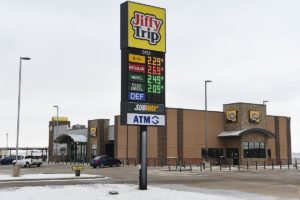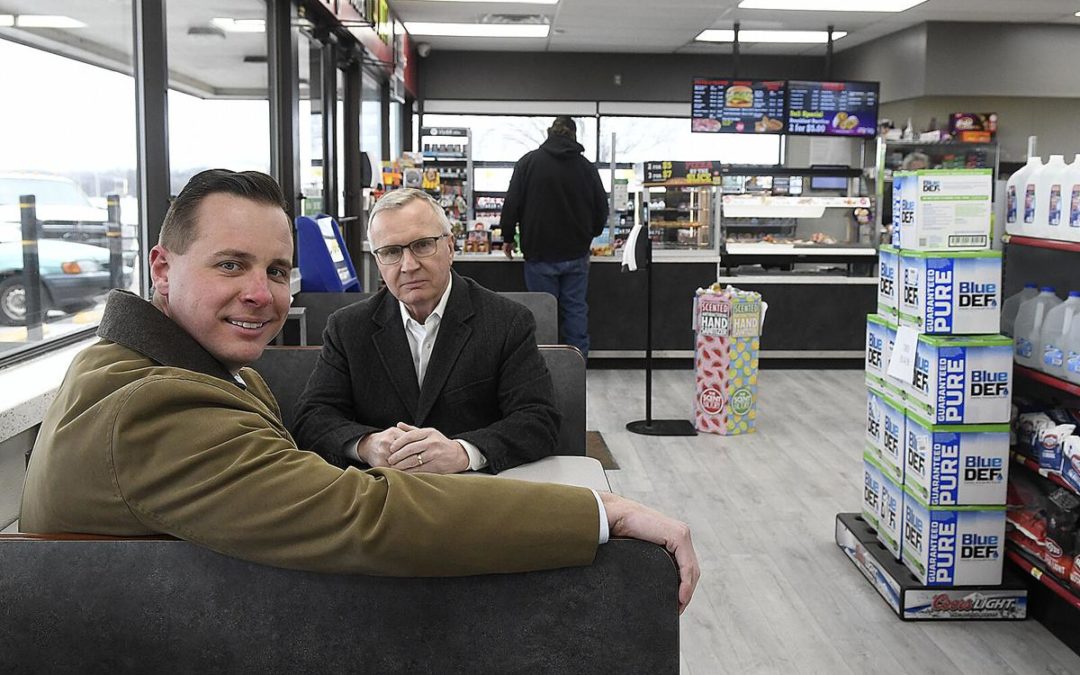ENID, Okla. — It was considered radical when K.V. Williams and partner Larry Hammer opened their first Jiffy Trip convenience store in Cherokee in 1972.
It was a place where you could get some food or snacks and drinks along with gas.
“My grandpa took a big risk when he did that,” said Alex Williams, chief operating officer of Hammer Williams Co., which now owns and operates 26 Jiffy Trip stores in the area. “A convenience store then was a place where you could buy gas and oil … it’s amazing how things have evolved.”
‘An interesting journey’
The Jiffy Trips, by evolving, have thrived in small towns, where customers go not only for gas but coffee, soft drinks, snacks, fruits, pizza and other hot food.
“My grandfather found things that worked and what people wanted when they were on the road … just the trend in consumer behavior today. Everyone wants it now … if we can find a way to get them what they want quickly and be convenient in a location that is great for them. It’s changed a lot from the 1970s.”
Jiffy Trips has locations in Carmen, Mooreland, Waynoka, Garber, Medford, Lahoma, Cleo Springs, Ringwood, Alva, Cherokee and Woodward among other places. They have built two new stores in Enid over the past two years, but their reputation was built in small towns.
“A lot of communities that we’re in were the only places you could stop and get fuel or be open after 5,” Williams said. “It’s been an interesting journey. We’re just blessed to be where we’re today.”
‘Something they can depend on’
Those small-town stores keep hours befitting of farm communities — 5 a.m. to 11 p.m. Woodward and Cherokee stores are open 24 hours.
“It’s funny that you can pull up to a store at 5 a.m., and they already have three people waiting outside the door so they can get a cup of coffee and a breakfast sandwich,” Williams said. “They really rely on us in these rural areas. They are early risers. It’s important for us to be there early in the morning. It’s fun seeing the same people every day and asking them how they are doing.”
Williams said his grandfather and father Kyle before him strived to build personal relationships in those small communities where there is a strong community bond.
“We have an amazing team within our community that allows us to grow and expand to newer and bigger markets,” he said. “I cannot emphasize how important it is to have that good team behind you. We wouldn’t be who we are today without those relationships.”
The stores employ anywhere from five to 10 people who, Williams said, have personal one-on-one relationships with customers. Many were customers themselves growing up.
“The customers really appreciate something they can depend on,” Williams said, “something that is kept clean and has a great selection of products at a fair price. We want to provide something that exceeds the expectations of the community. Our company motto is serving people, whether it’s the people who work for us or them serving customers. We take care of our employees, and our employees take care of the customers. That’s how you have a successful business.”
‘Good community partner’ 
The consistency of store managers and employees has been critical. They know each other by name, can joke around with each other and talk about what’s going on in the community.
“They see the same person at 7 in the morning getting a cup of coffee,” Williams said. “The same people stop by at lunch for a drink. These relationships are very important in a small community.”
In addition to convenience and dependability, sales tax revenue is a “big portion” of a lot of the smaller towns finances.
“We just look to be a good community partner,” Williams said. “We try to support the schools, law enforcement … a lot of things that we pride ourselves on in these communities.”
The stores try to get behind school athletic teams, FFA and other organizations.
Heart of the business
Williamses said the stores have a diverse work force, and Jiffy Trip takes pride in how well it pays its employees.
“I think that’s an advantage we have over most competitors,” he said. “We want to take care of our employees.”
While the Williams have expanded into multiple business ventures, Jiffy Trip still is the heart of the business. Williams himself got his start as a store manager in Mannford.
“We see Jiffy Trips as having a great future,” he said. “That’s why we are expanding and reinvesting and creating jobs. We have built a brand that can go up against the best of the best. We have offerings that can compete with anybody, even in the larger metro areas.”
Northwest Oklahoma survivors
In the past year, Jiffy Trip has felt the impact of the COVID-19 pandemic, Williams said, especially in March and April.
Things still aren’t 100%, Williams said, but “we’re still rebounding.”
“It’s been a challenging year, especially for the employees. They stood in there and served the people in their communities. It wasn’t an easy thing. They should be applauded.”
Northwest Oklahoma has survived, Williams said, because of “incredible integrity and work ethic … you can’t say that about everywhere.”
While declining rural populations is “worrisome,” Williams feels good about the future stability of the area.
The area has felt the slump in the oil and gas industry, he said, but when those jobs come back, so will much of the economy and jobs.
“I don’t see it as anything to worry about in the long term,” Williams said. “It goes in spurts.”
‘The day that comes’
Williams and his staff are trying a number of different concepts at the stores, including adding items “you can’t get at any other place.”
Pizza has thrived at the Lahoma location, with Williams calling it the best convenience store pizza around. They have expanded the fountain drinks. There are slushies and bean-to-cup coffee.
“You can now draw a line through the center of our newest stores where it’s half convenience store and the other half being fresh food and drinks … people want it fresh and want healthier options. We were listening, and we have designed that in mind.”
“Those are things you wouldn’t find in another convenience store,” Williams said. “We make fresh salads every day. We bring in fruit twice a week. We’re preparing fresh food every hour from 4 a.m. to 9 p.m. It’s just a staple of food in a lot of these communities.”
The biggest thing on Williams’ radar, he said, is the conversion of combustible energy vehicles to electric cars.
“That’s something we have to be paying attention to,” he said. “We are building a plan for the day that comes. It will probably be slower to come to Oklahoma … it will come to the Coast first, but electric vehicles will continue to grow. We’re aware of it, and we’re making plans to accommodate for that.
“We’re always looking to the future and anticipating changes or interruptions … we feel like we will be in good shape.”
Article by: Bruce Campbell – Enid News & Eagle 2.21.21
Photos by: Billy Hefton

